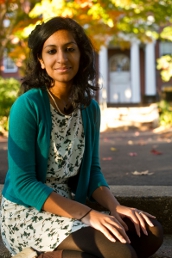Deadly Resurgence
By Marjorie Howard
As cholera makes a comeback, an engineering student seeks ways to combat it

“As an engineer, your goal is to prevent bad things from happening,” says Maimuna Majumder, E12. Photo: Alonso Nichols
Before Maimuna Majumder, E12, enrolled at Tufts, her entire freshman class was required to read The Blue Death: The Intriguing Past and Present Danger of the Water You Drink.
The book describes early efforts to ensure clean drinking water and highlights the work of the English physician John Snow, who in 1854 used simple sleuthing methods to discover that cholera was a waterborne disease. Walking from house to house in one London neighborhood, he learned that each affected household used the same public water pump, the source of the disease.
Three years later, Majumder found herself following in Snow’s footsteps, doing research in Bangladesh to identify ways to combat cholera, a crippling bacterial infection of the small intestines.
Cholera is characterized by diarrhea and vomiting, resulting in acute dehydration. Without treatment, it often results in death, but if dealt with quickly by replacing fluids, patients recover.
While Bangladesh does not issue reports on cholera cases, the World Health Organization estimates there may be as many as 1 million cases in the country every year. The economic costs and physical toll are high for the impoverished country of 160 million. And Bangladesh isn’t alone in facing the disease. It has made a recent resurgence in Haiti, after being eradicated in the 1960s, as well as in Nigeria and other countries in West Africa.
Majumder spent the summer in Bangladesh, beginning a study of 10 years worth of cholera patient data collected by the International Centre for Diarrhoeal Disease Research, Bangladesh (ICDDRB), which has two major clinics in the country. The goal of the research, which was supported by the Institute of Global Leadership at Tufts and the Tufts Summer Scholars program, was to see which variables seemed to play a role in protecting people from the disease.
With guidance from her Summer Scholars’ advisor, David Gute, a professor of civil and environmental engineering, and her mentor from the ICDDRB, she analyzed the data, looking at factors such as use of sanitary latrines, whether drinking water was boiled and the level of monthly household income. Boiling water emerged as the key way to prevent the disease, but she was surprised to discover that this simple and widely accepted practice has not been well documented, something she hopes to do in a paper she is working on.
It’s All in the Water
Preventing cholera, she says, is not difficult: you simply have to boil water for about a minute to kill the bacteria. “It’s cheap to do, and it gets rid of everything,” she says. “I drank boiled water the entire time I was in the country, and I was fine. That’s the key to it all; if you boil your water you won’t get sick.”
It sounds easy, but there are obvious obstacles. Many people cannot afford fuel, and even in well-to-do urban areas the supply of gas for cooking—and boiling water—may be limited to just a few hours a day. Majumder believes it would be cost effective to find new ways to help people boil water using solar power.
She also hopes to solve an epidemiological puzzle. She found a report by a researcher who noted that in Matlab, a rural region of Bangladesh where the ICCRDB has a clinic, people routinely boil water but get sick anyway. Majumder thinks she knows why.
According to Majumder, local well water in Matlab contains high amounts of iron, which discolors utensils. So people instead often wash their implements in the river water, which contains the cholera bacteria. In addition, people bathe in local rivers and streams, and may unwittingly ingest Vibrio cholerae, the bacteria that cause the disease.
Majumder’s inspiration comes not only from the required freshman reading, but from her connection to Bangladesh, which she visits often to see relatives—both her parents were born there, and she speaks fluent Bengali. One of her prime motivators is her father, Shafiqul Islam, a professor of civil and environmental engineering, who is doing research to detect cholera in the ocean before it spreads into regional water systems. She has been listening to kitchen table discussions about engineering research and public health since she was small, she says—her mother, too, was trained as an engineer.
“As an engineer,” she says, “your goal is to prevent bad things from happening.”
Gute agrees. “If a person is sick with cholera you can give them oral rehydration,” he says. “Wouldn’t it be much better not to have the person be sick in the first place? That’s Maia’s overarching goal, to figure out what interventions might work.”
Marjorie Howard can be reached at marjorie.howard@tufts.edu.
